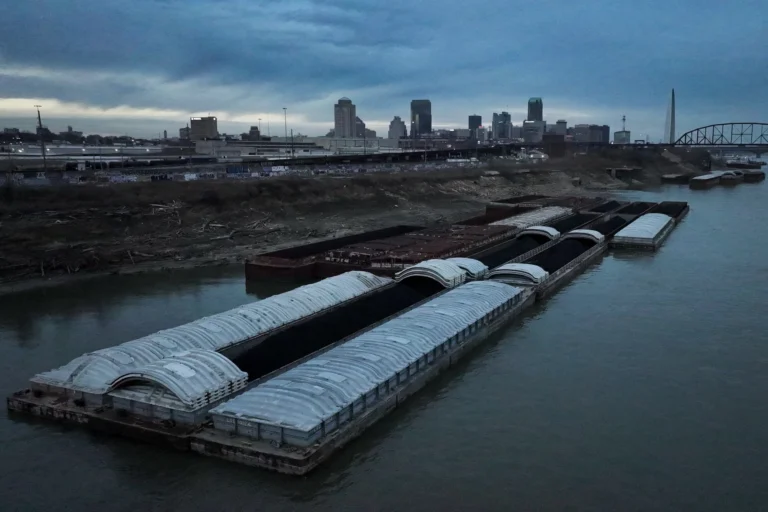Legal agreements govern the Great Lakes and some river systems in the U.S., but the Mississippi River doesn’t have a compact. Some mayors on the waterway think it’s time to change that.
A group of mayors is launching a new call for an overarching legal framework for the Mississippi River.
The mayors are collecting signatures from their colleagues along the river on a document calling for a water compact, which would be an agreement between states and tribes that would control the use of the Mississippi.
“What I’d like to see is a compact that protects this natural resource for many, many years to come, that develops some preventative measures to make sure that the water that we have is clean and safe and also doesn’t harm other states downstream,” said St. Louis Mayor Tishaura Jones, who is still reviewing the document and has not yet signed it.
The Mississippi River Cities and Towns Initiative is an association of more than 100 mayors from the 10 states along the main stem of the waterway and is the organizing force behind this call for a compact. The group’s executive committee approved an agreement in early December that is now circulating among mayors and tribal leaders for signatures. The document calls on Congress to adopt a binding river-wide agreement, while also advocating for steps to reduce pollution and improve water quality on the river.
The larger group of local leaders has already expressed support for the effort, voting unanimously in September 2023 for MRCTI to pursue the formulation of a Mississippi River Compact. This step to sign onto an agreement is part of that same process.
“There’s a lot of support for this, and there’s a lot of excitement that this could create protections that are very much needed,” said MRCTI executive director Colin Wellenkamp.
The call for a legal agreement has been prompted by worsening climate emergencies like drought and flooding that are putting stress on the river, Wellenkamp said.
“As large scale areas of the continent of North America see drier, hotter periods, and other areas see wetter, more flood prone areas, it is shifting the calculus of natural resource management at a continental scale, and all of these things are making it necessary for us to move faster,” Wellenkamp said.
For the third year in a row, drought pushed Mississippi water levels so low it led to slower and more expensive transportation for crops this summer. The Midwest will experience even more drought in the coming years because of climate change, according to the National Climate Assessment.
The mayors are also watching worsening water scarcity in western states and hoping to head off any attempt to take water from their region.
“We want to make sure that we preserve the Mississippi River as much as possible,” Mayor Jones of St. Louis said.
A legal process
In its most simple terms, a water compact equitably allocates water to states in a basin, said Burke Griggs, a professor at Washburn University School of Law in Kansas. But Griggs said “equitable” is a loaded term.
“When you think about an equitable allocation, you are not just allocating the water supplies of the basin, you’re allocating the economic benefits that the water use provides,” Griggs said.
Similar compacts are in place in other large American water systems, like the Great Lakes and the Colorado River Basin, but the Mississippi River does not have a compact.
Recent efforts to create new compacts on other rivers have failed, Griggs said, largely because states have struggled to come to negotiated agreements over sharing the rivers in question. For the Mississippi, Griggs thinks that could be even more complicated.
“I think the multitude of interests and the state and federal interests in the river are going to make for some very complicated and challenging tasks, if we are to reach some sort of compact there,” Griggs said.
A long way to go
The plan is still a long way off from being implemented, said Mayor Bob Gallagher of Bettendorf, Iowa, a city of about 40,000 people that is part of the Quad Cities metro area in Illinois and Iowa.
“We’re in the baby stages,” Gallagher said.
Along with the agreement that the mayors are circulating for signatures, the group is also putting together a task force of state legislators in the 10 states along the river to work on the issue.
Ultimately, the states would have to come to a negotiated agreement for the river, which would then go to Congress for approval through legislation and ultimately be signed by the president, Griggs said.
Despite the early stages, Bettendorf Mayor Gallagher is excited by this opportunity to create something that could help a diverse group of communities. He thinks investment in the lock and dam infrastructure nearby would benefit his constituents directly. But he noted that any efforts to improve water quality would affect the almost 20 million Americans that drink from the Mississippi.
“The shared management of the river, the protection of the river, the creation of resiliency along the river, is very important for all of us,” Gallagher said.

